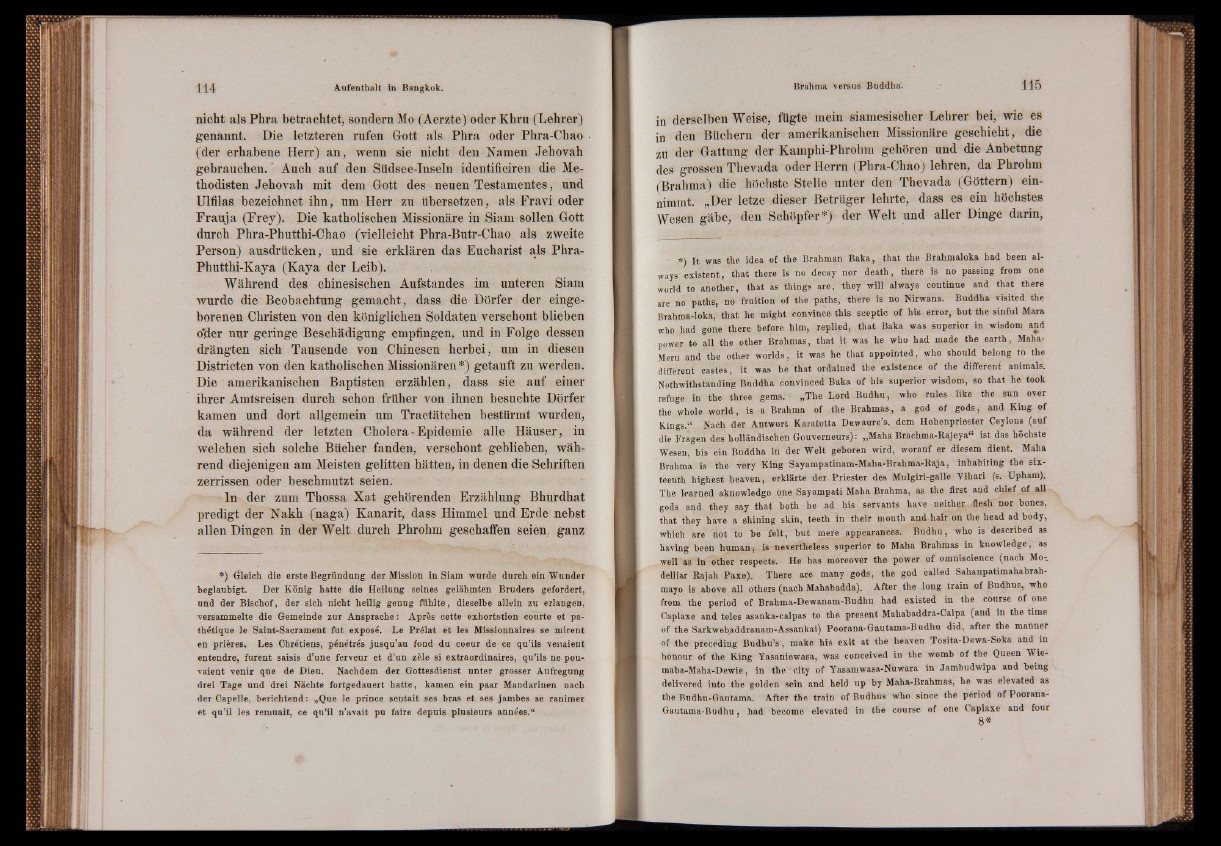
nicht als Phra betrachtet, sondern Mo (Aerzte) oder Khru (Lehrer)
genannt. Die letzteren rufen Gott als Phra oder Phra-Chao
(der erhabene Herr) an , wenn sie nicht den Namen Jehovah
gebrauchen.' Auch auf den Südsee-Inseln identificiren die Methodisten
Jehovah mit dem Gott des neuen Testamentes, und
Ulfilas bezeichnet ihn, um Herr zu übersetzen, als Fravi oder
Frau ja (Frey). Die katholischen Missionäre in Siam sollen Gott
durch Phra-Phutthi-Chao (vielleicht Phra-Butr-Chao als zweite
Person) ausdrücken, und sie erklären das Eucharist als Phra-
Phutthi-Kaya (Kaya der Leib).
Während des chinesischen Aufstandes im unteren Siam
wurde die Beobachtung gemacht, dass die Dörfer der eingeborenen
Christen von den königlichen Soldaten verschont blieben
o'der nur geringe Beschädigung empfingen, und in Folge dessen
drängten sich Tausende von Chinesen herbei, um in diesen
Districten von den katholischen Missionären*) getauft zu werden.
Die amerikanischen Baptisten erzählen, dass sie auf einer
ihrer Amtsreisen durch schon früher von ihnen besuchte Dörfer
kamen und dort allgemein um Tractätchen bestürmt wurden,
da während der letzten Cholera - Epidemie alle Häuser, in
welchen sich solche Bücher fanden, verschont geblieben, während
diejenigen am Meisten gelitten hätten, in denen die Schriften
zerrissen oder beschmutzt seien.
ln der zum Thossa Xat gehörenden Erzählung Bhurdhat
predigt der Nakh (naga) Kanarit, dass Himmel und Erde nebst
allen Dingen in der Welt durch Phrohm geschaffen seien, ganz
*) Gleich die erste Begründung der Mission in Siam wurde durch ein Wunder
beglaubigt. Der König hatte die Heilung seines gelähmten Bruders gefordert,
und der Bischof, der sich nicht heilig genug fühlte, dieselbe allein zu erlangen,
versammelte die Gemeinde zur Ansprache: Après cette exhortation courte et pathétique
le Saint-Sacrament fut exposé. Le Prélat et les Missionnaires se mirent
en prières. Les Chrétiens, pénétrés jusqu’au fond du coeur de ce qu’ils venaient
entendre, furent saisis d’une ferveur et d’un zèle si extraordinaires, qu’ils ne pouvaient
venir que de Dieu. Nachdem der Gottesdienst unter grösser Aufregung
drei Tage und drei Nächte fortgedauert hatte, kamen ein paar Mandarinen nach
der Capelle, berichtend: „Que le prince sentait ses bras et ses jambes se ranimer
et qu’il les remuait, ce qu’il n’avait pu faire depuis plusieurs années.“
in derselben Weise, fügte mein siamesischer Lehrer bei, wie es
in den Büchern der amerikanischen Missionäre geschieht, die
zu der Gattung der Kamphi-Phrohm gehören und die Anbetung
des grossen Thevada oder Herrn (Phra-Chao) lehren, da Phrohm
(Brahma) die höchste Stelle unter den Thevada (Göttern) einnimmt.
„Der letze dieser Betrüger lehrte, dass es ein höchstes
Wesen gäbe, den Schöpfer*) der Welt und aller Dinge darin,
*) It was the idea of the Brahman Baka, that the Brahmaloka had been always
existent, that there is no decay nor death, there is no passing from one
world to another, that as things are, they wUl always continue and that there
ate no paths, no fruition of the paths, there is no Nirwana. Buddha visited the
Brahma-loka, that he might convince this sceptic of his error, but the sinful Mara
who had gone there before him, replied, that Baka was superior in wisdom and
power to all the other Brahmas, that it was he who had made the earth, Maha-
Meru and the other worlds, it was he that appointed, who should belong to the
different castes, it was he that ordained the existence of the different animals.
Nothwithstanding Buddha convinced Baka of his superior wisdom, so that he took
refuge in the three gems. * „The Lord Budhu, who rules like the sun over
the whole world, is a Brahma of the Brahmas, a god of gods, and King of
Kings.“ Nach der Antwort Karatotta Dawaure’s. dem Hohenpriester Ceylons (auf
die Fragen des holländischen Gouverneurs): „Maha Brachma-Rajeya“ ist das höchste
Wesen, bis ein Buddha in der Welt geboren wird, worauf er diesem dient. Maha
Brahma is the very King Sayampatinam-Maha-Brahma-Baja, inhabiting the sixteenth
highest heaven, erklärte der Priester des Mulgiri-galle Vihari (s. Upham).
The learned aknowledge one Sayampati Maha Brahma, as the first and chief of all
gods and they say that both he ad his servants have neither flesh nor bones,
that they have a shining skin, teeth in their mouth and hair on the head ad body,
which are not to be felt, but mere appearances. Budhu, who is described as
having been human, is nevertheless superior to Maha Brahmas in knowledge, as
well as in other respects. He has moreover the power of omniscience (nach Modellier
Bajah Paxe). There are many-gods, the god called Sahanpatimahabrah-
mayo is above all others (nach Mahabadda). After the long train of Budhus, who
from the period of Brahma-Dewanam-Budhu had existed in the course of one
Caplaxe and teles asanka-calpas to the present Mahabaddra-Calpa (and in the time
of the Sarkweb.addranam-Assankai) Poorana-Gautama-Budhu did, after the manner
of the preceding Budhu’s , make his exit at the heaven Tosita-Dewa-Soka and in
honour of the King Yasaniewasa, was conceived in the womb of the Queen Wie-
maba-Maha-Dewie, in th e ‘city of Yasamwasa-Nuwara in Jambudwipa and being
delivered into the golden sein and held up by Maha-Brahmas, he was elevated as
the Budhu-Gautama. After the train of Budhus who since the period of Poorana-
Gautama-Budhu, had become elevated in the course of one Caplaxe and four
8*